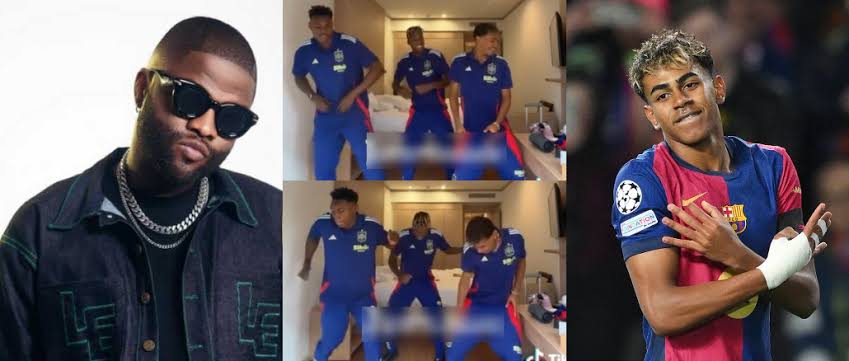Biography
Skales Biography: Starting Point, Difficulties, Global Viral Song, Lamine Yamal’s major contribution on his Career and More
The Life and Career of Skales: From Humble Beginnings to Global Recognition – Early Life and Musical Genesis
Raoul John Njeng-Njeng, professionally known as Skales, was born on April 1, 1991, in Kaduna State, Nigeria. Raised in a single-parent household, Skales was nurtured by his mother, who undertook various menial jobs to provide for him. This upbringing instilled in him a deep appreciation for hard work and perseverance. His musical journey commenced at the age of nine when he began writing rap songs, drawing inspiration from his environment and experiences.
During his time at the University of Jos, Skales collaborated with renowned producers Jeremiah Gyang and Jesse Jagz, further honing his craft. His participation in the Zain Tru Search competition in 2008 marked a significant milestone, as he emerged victorious in the North Central region. This achievement led to increased recognition and opportunities within the Nigerian music industry.
The E.M.E Era: Rise to Prominence
In 2009, Skales relocated to Lagos and secured a recording contract with Empire Mates Entertainment (E.M.E), a label founded by Banky W. and Wizkid. Under E.M.E, Skales released several tracks that garnered attention, including “Must Shine,” “Shake Body,” and “Komole.” His collaborations with artists such as Banky W., Wizkid, and Shaydee further solidified his position in the Nigerian music scene.
However, despite the initial success, Skales faced challenges within the label. Reports indicate that E.M.E executives were dissatisfied with the financial returns from their investment in Skales, leading to the expiration of his contract without renewal in 2014 .

Transition to Independence: Founding OHK Music
Following his departure from E.M.E, Skales encountered significant financial difficulties. He was reportedly homeless and relied on the hospitality of fellow artists, including Timaya, who offered him temporary accommodation . During this challenging period, Skales released the track “Shake Body,” which gained popularity and reignited interest in his music.
Recognizing the need for independence, Skales established his own record label, OHK Music, in 2014. The label provided him with the autonomy to control his creative output and business ventures. Under OHK Music, Skales released his debut studio album, Man of the Year, in 2015, which featured collaborations with artists such as Olamide and Davido.
Olamide’s Support: A Turning Point
During a particularly challenging phase in Skales’ career, Olamide, a prominent figure in the Nigerian music industry, extended a helping hand. Skales revealed that Olamide funded the music video for “Shake Body” when he was financially unable to do so. This gesture had a profound impact on Skales, both personally and professionally .
The success of “Shake Body” marked a significant resurgence in Skales’ career. The song’s popularity led to increased bookings for performances and collaborations with other artists, thereby stabilizing his position in the music industry.

Relationship with Wizkid and Subsequent Feud
Early Friendship and Collaboration
Skales and Wizkid had initially been introduced as label mates under Empire Mates Entertainment (E.M.E) around 2009. Their time at the label was marked by frequent collaborations, shared performances, and joint appearances at industry events. A strong professional relationship had been fostered, and a mutual respect for each other’s talent had been publicly acknowledged. Songs were recorded together, and stage chemistry was frequently praised by fans and the media.
During their early years at E.M.E, it was perceived that both artists were being groomed for major stardom. While Wizkid’s debut album, Superstar, achieved massive commercial success and propelled him into the international spotlight, Skales remained relatively less prominent, despite having put out a number of singles and features. Nonetheless, their camaraderie appeared solid throughout the early 2010s.
The Emergence of Tension
As time progressed, signs of a strained relationship began to surface. Speculations were fueled by fans who noticed a decline in their public interactions and musical collaborations. Although no formal statements had been made initially, rumors of discord between the two artists began to spread within industry circles and on social media.
In subsequent interviews, Skales acknowledged that the friendship had deteriorated and that contact with Wizkid had ceased. It was revealed that creative differences and misunderstandings regarding credit and recognition might have played a role in the fallout. Skales would later hint at feeling sidelined or underappreciated during their time at E.M.E, although exact details were kept vague.
Public Disagreements and Online Exchange
The feud became more visible in 2015 when a Twitter exchange between the two artists escalated into a public dispute. Skales had made a comment during an interview that he believed he was a better songwriter than Wizkid. This statement was not received lightly, and Wizkid responded on Twitter, criticizing Skales and belittling his career accomplishments. The exchange quickly went viral, drawing in fans and celebrities who took sides or called for peace.
Although the tweets were later deleted, the damage had been done. Both artists stopped referencing each other in interviews, and any hope of a reconciliation seemed increasingly unlikely. The incident was widely reported in the Nigerian entertainment press and is often cited as one of the more high-profile celebrity feuds in Afrobeats history.
Reflections and Distance Maintained
In later years, Skales spoke more reflectively about the feud, often downplaying the animosity and expressing a desire to focus on his own growth rather than conflicts. In a 2020 interview, he mentioned that the past was behind him and that he was more concerned with building his brand and music legacy. Wizkid, on the other hand, chose not to publicly revisit the issue.
Despite operating within the same industry and occasionally attending the same events, both artists have kept their distance. No new collaborations have been recorded between them, and their relationship continues to be defined more by its abrupt end than its promising beginning.
Industry Impact and Fan Reactions
The fallout between Skales and Wizkid had a polarizing effect on their respective fan bases. While Wizkid’s global rise continued, Skales faced periods of obscurity and was often compared unfavorably to his former label mate. However, the feud also garnered sympathy and support for Skales, particularly during his resurgence with “Shake Body,” when fans credited him for perseverance in an industry known for its competitiveness and harsh judgments.
In retrospect, their relationship is often used as a cautionary tale in the entertainment industry, a reminder of how professional camaraderie can quickly sour due to pride, miscommunication, and public pressure. Although a reconciliation has never been officially ruled out, no such efforts have been publicly made as of 2025.
The Skales-Wizkid relationship, while brief in its harmonious phase, had left an indelible mark on Nigerian pop culture, and continues to be a topic of discussion whenever the history of E.M.E and the evolution of modern Afrobeats is revisited.

Personal Life and Tragedy
Skales’ personal life has been marked by both achievements and hardships. In December 2011, he was involved in a car accident along the Lekki-Epe Expressway, which resulted in one fatality and several injuries . Despite this traumatic experience, Skales continued to pursue his music career with renewed vigor.
In March 2021, Skales announced his engagement to his girlfriend on Instagram, signaling a new chapter in his personal life. While details about his family are limited, Skales has expressed gratitude for the support he received from his mother during his formative years.
Last year, Skales lost his mother to the cold hands of death. Skales, who has spoken about the challenges he faced growing up in a single-parent household, with his mother working hard to support him. He has also dedicated his upcoming album to his late mother’s name.
Career Resurgence and Viral Success
The release of “Shake Body” in 2014 was a pivotal moment in Skales’ career. The song’s infectious rhythm and catchy lyrics resonated with audiences, leading to widespread acclaim. Skales capitalized on this momentum by releasing subsequent hits, including “Je Kan Mo,” “Always,” and “Ajaga,” which featured collaborations with artists such as Davido and Timaya.
Lamine Yamal’s Contribution to the Viral Revival of “Shake Body”
Accidental Virality Through Social Media
In early 2025, a remarkable and entirely unanticipated resurgence of Skales’ 2014 hit single “Shake Body” was triggered—not by a planned marketing campaign or a remix collaboration, but by a spontaneous moment shared by one of the world’s most promising young football talents. Lamine Yamal, the 17-year-old FC Barcelona prodigy, had casually posted a video of himself dancing to “Shake Body” on TikTok. This video, likely shared for entertainment rather than promotion, would prove to be one of the most culturally significant events of Skales’ career in recent years.
The video, characterized by Yamal’s relaxed demeanor and lighthearted choreography, went viral within hours of posting. Garnering over 12 million views within its first week, the video drew attention not only from football fans across the globe but also from music enthusiasts curious about the infectious Afrobeat rhythm featured in the background. TikTok users worldwide began using the sound in their own videos, reviving the song’s popularity and introducing it to a new generation of listeners who had likely never heard of Skales before.
This surge in popularity was organically driven. No promotional budget had been allocated, no influencer campaign had been strategized, and no label-backed rollout had been prepared. It was a rare instance where digital virality was fueled by the intersection of sport and culture—an authentic embrace of Afrobeat by a young global icon.
Reaction from Skales and the Nigerian Music Scene
Skales, upon discovering the viral phenomenon, responded with gratitude and excitement. Public statements were issued across his social media platforms, where he thanked Lamine Yamal for what he called a “life-changing gesture.” It was noted that Skales had quickly updated his Instagram bio to include “Barcelona fan” shortly after the video’s circulation began.
In interviews, Skales admitted that the renewed attention brought about a significant spike in digital streams and downloads of “Shake Body.” Bookings for live shows increased, invitations for international collaborations were extended, and the song was featured on several major playlists across streaming platforms such as Spotify, Apple Music, and Boomplay. The ripple effect from a single TikTok post reshaped the commercial trajectory of a track that had been released over a decade earlier.
Within Nigeria, the moment was celebrated widely. It was viewed as another example of how Afrobeat had truly become a global genre, capable of being embraced spontaneously by global youth in the most unpredictable ways. For many in the Nigerian entertainment industry, it was a validation of the longevity and global appeal of Afrobeat classics.
Meeting Lamine Yamal and His Family
A Historic Encounter at Barcelona’s Copa del Rey Celebrations
The virtual connection between Skales and Lamine Yamal was eventually transformed into a real-life meeting. Following FC Barcelona’s victory in the 2024–25 Copa del Rey final, the club hosted celebratory events attended by players, their families, club officials, and selected guests. Skales, now considered an honorary ambassador of sorts due to his viral link to the club’s star player, was invited to the festivities.
During the celebrations in April 2025, Skales met Lamine Yamal, his mother, and his younger brother in a private reception held at the club’s facility. A video was posted by Skales on his Instagram and X (formerly Twitter) accounts, in which he was seen dancing to “Shake Body” alongside Yamal’s mother and little brother. The video, described by fans as heartwarming and symbolic, quickly amassed millions of views.
The meeting was seen as emblematic of how music can transcend cultural, linguistic, and geographical boundaries. Here was a Nigerian artist whose music had resonated with a young Spanish-Moroccan footballer, culminating in a real-world encounter that was marked by joy, mutual respect, and shared admiration.

Significance and Cultural Symbolism
The encounter was more than just a publicity event, it also served as a cultural bridge between West African musical heritage and European football prestige. Yamal’s mother was seen laughing and dancing with Skales, despite a language barrier. The bond created through the music of “Shake Body” highlighted the universality of rhythm and expression. It demonstrated how a shared experience through music could forge connections between people who, under normal circumstances, would never have crossed paths.
Following the event, Skales took to social media again, writing:
“Music truly is a universal language. Thank you to Lamine and his beautiful family for this unforgettable moment. This means more than words can express.”
Media Attention and Industry Implications
International media outlets such as TheCable Lifestyle, Pulse Nigeria, Marca, and ESPN FC covered the moment, framing it as a unique intersection of sport and music. The incident spurred discussions within the entertainment industry about the evolving nature of music distribution and cultural relevance in the digital age.
It was noted by media analysts that Skales’ career had been revitalized in ways that could not have been orchestrated by traditional PR strategies. Conversations were sparked around how artists from Africa might leverage global platforms like TikTok and football’s vast fan base to gain international exposure.
Renewed Career Momentum
As a result of this event, bookings for Skales surged across Europe and Africa. His label, OHK Music, was reported to be negotiating a European tour. Merchandise featuring the hashtag #ShakeBodyChallenge was produced. Additionally, Skales confirmed in later interviews that new music was being recorded with European producers, some of whom had reached out after the viral video.
Lamine Yamal was credited not just with showcasing a song, but with influencing an artist’s career in real-time. Music historians and digital strategists began referencing the moment as a case study on the unplanned but powerful role that athletes and influencers now play in shaping music careers.
In conclusion, Lamine Yamal’s inadvertent contribution to Skales’ resurgence exemplified the unpredictable magic of the internet and the cross-cultural power of Afrobeat. It was a moment that will likely be studied and celebrated for years to come and not just by fans of music and football, but by marketers, sociologists, and cultural historians who seek to understand how influence is now wielded across platforms and geographies.
Upcoming Projects and Future Endeavors
Looking ahead, Skales is set to release his collaborative album, Volumes, with producer Jay Pizzle in 2024. The album is anticipated to showcase a blend of Afrobeats and hip-hop influences, reflecting Skales’ versatility as an artist. Additionally, Skales continues to manage OHK Music, nurturing emerging talents and expanding his influence in the music industry.
Net Worth and Legacy
As of 2025, Skales’ net worth is estimated to be between $1 million and $3 million, reflecting his successful music career, business ventures, and endorsements . Beyond his financial success, Skales’ journey serves as an inspiration to aspiring artists, demonstrating the power of resilience, collaboration, and self-belief in overcoming adversity.

Conclusion
Skales’ journey from a young boy in Kaduna to a recognized figure in the global music scene is a testament to his talent, perseverance, and the support of key individuals along the way. His story underscores the importance of community, mentorship, and staying true to one’s passion in the face of challenges. As he continues to evolve as an artist and entrepreneur, Skales remains a significant influence in the Nigerian and global music industries.












